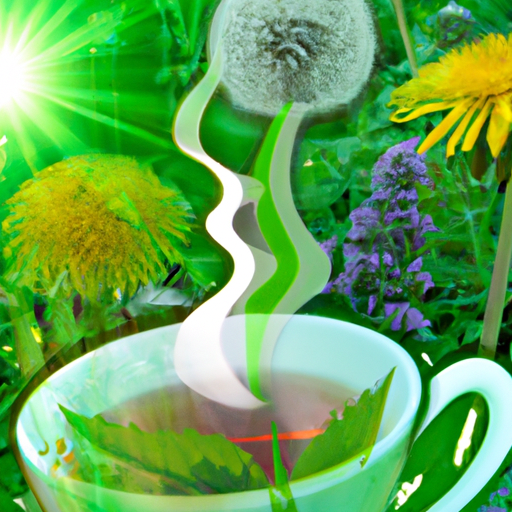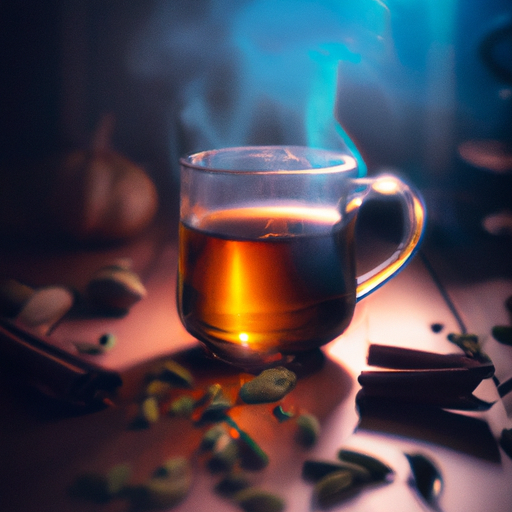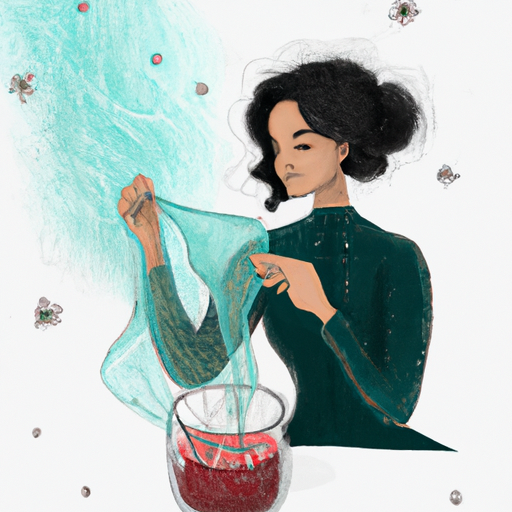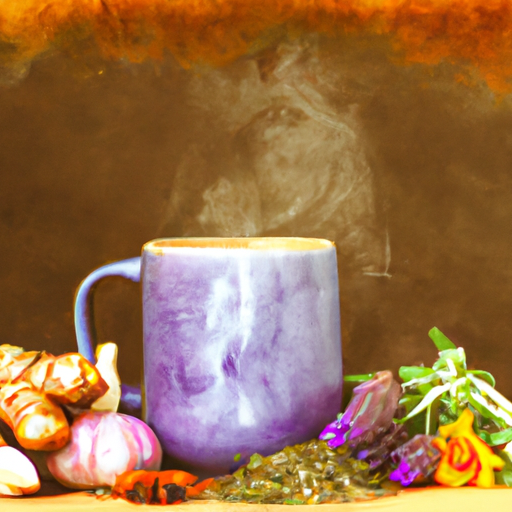Did you realize that **more than 60%** of Americans drink tea every day? **It’s no wonder**, given the many health advantages linked to this traditional drink. **Discover more about the benefits of tea** and why you should make it a part of your daily routine!
But when it comes to choosing the right tea to soothe your symptoms when you’re sick, the options can be overwhelming. In this article, I will explore the age-old debate of whether herbal tea or green tea is better for combating illness. Both types of tea offer unique health benefits, from boosting the immune system to relieving congestion.
We will delve into the different tastes and flavors of herbal and green tea, helping you make an informed decision based on your personal preferences. Additionally, I will provide brewing and preparation tips, as well as highlight potential side effects and precautions to consider.
So, grab your favorite mug and join me as we uncover the best tea to sip on when you’re feeling under the weather.
Key Takeaways
- Herbal tea, such as chamomile tea, is beneficial for promoting relaxation and reducing anxiety, as well as aiding digestion and having anti-inflammatory properties.
- Green tea has unique health benefits, including boosting the immune system, aiding in weight loss, promoting skin health, and improving cognitive function.
- When choosing between herbal tea and green tea for symptoms, it is important to consider flavor preferences, as herbal tea can have delicate or robust flavors, while green tea has a vegetal and slightly bitter taste.
- Both herbal tea and green tea can alleviate specific symptoms, such as respiratory issues, congestion, and coughing, but herbal tea with eucalyptus or peppermint is particularly soothing, while green tea provides a gentle and sustained energy boost.
Health Benefits of Herbal Tea
If you’re feeling under the weather, herbal tea can be a soothing and natural way to boost your health. Chamomile tea, in particular, has numerous health benefits that make it a great choice when you’re sick.
One of the main benefits of chamomile tea is its ability to promote relaxation and reduce anxiety. It contains compounds that bind to certain receptors in the brain, helping to calm the nervous system and promote a sense of tranquility.
Additionally, chamomile tea has been shown to have anti-inflammatory properties, which can help alleviate symptoms of a sore throat or cough. It has also been used for centuries to aid digestion, as it can help soothe the stomach and relieve indigestion.
Overall, chamomile tea is a great option to have when you’re feeling sick and in need of some natural healing.
Moving on to the health benefits of green tea, this popular beverage is packed with antioxidants that can help boost your immune system and fight off illness.
Health Benefits of Green Tea
Indulge in the aromatic elixir that nurtures and invigorates your well-being, offering a stream of healthful properties that leave you feeling refreshed and rejuvenated. Green tea, renowned for its numerous health benefits, has gained popularity worldwide.
Not only is it a delicious beverage, but it also aids in weight loss and promotes skin health. One of the most well-known benefits of green tea is its potential to aid in weight loss. It contains catechins, a type of antioxidant that has been shown to boost metabolism and increase fat burning. By incorporating green tea into your daily routine, you may experience a slight increase in calorie burn, which can contribute to weight loss over time.
In addition to its weight loss benefits, green tea is also known for promoting skin health. It contains antioxidants that help protect the skin from damage caused by free radicals. These antioxidants can also help reduce inflammation and improve the overall appearance of the skin, giving it a healthy and youthful glow.
Transitioning into the next section about the comparison of taste and flavor, it is important to consider not only the health benefits but also the sensory experience that herbal tea and green tea provide.
Comparison of Taste and Flavor
Immerse yourself in the sensory journey of comparing the tastes and flavors of herbal and green tea, discovering the unique nuances and aromas that each brew offers. When it comes to flavor preferences, both herbal tea and green tea have their own distinct characteristics.
In terms of herbal tea, the flavor profiles can vary greatly depending on the specific herbs used. Some herbal teas have a delicate and floral taste, while others have a more robust and earthy flavor. Chamomile tea, for example, has a light and soothing taste with hints of apple and floral notes. On the other hand, peppermint tea has a refreshing and cooling flavor that is invigorating to the senses.
Green tea, on the other hand, has a more vegetal and slightly bitter taste. It can range from being mildly grassy to having a more pronounced umami flavor. The flavor of green tea can also be influenced by factors such as the type of tea leaves used, the processing method, and the brewing time.
When considering which tea to choose for your symptoms, it is important to take into account your flavor preferences as well as the potential health benefits of the herbal remedies. Transitioning into the subsequent section, we’ll explore how to choose the right tea for your specific symptoms.
Choosing the Right Tea for Your Symptoms
When it comes to choosing the right tea for my symptoms, I’ve found that herbal tea is particularly beneficial for respiratory issues. The natural ingredients in herbal tea, such as eucalyptus or peppermint, can help soothe congestion and promote easier breathing.
On the other hand, if I need a pick-me-up and want to boost my energy and alertness, green tea is my go-to choice. The caffeine content in green tea provides a gentle and sustained energy boost without the jitters often associated with coffee.
Herbal Tea for Respiratory Issues
Breathe in the soothing aroma of herbal tea to ease respiratory issues. Herbal teas are known for their numerous health benefits, particularly when it comes to respiratory problems. Many herbs used in herbal teas, such as ginger, peppermint, and chamomile, have anti-inflammatory and antimicrobial properties that can help alleviate congestion, coughing, and other respiratory symptoms. Additionally, herbal teas can provide relief from sore throat and promote relaxation, allowing your body to heal faster. To make the most of herbal tea’s benefits, you can try different recipes that incorporate specific herbs known for their respiratory benefits. For example, a blend of eucalyptus, thyme, and lemon balm can help clear your airways and soothe coughs. Transitioning into the next section, green tea is a great option for boosting energy and alertness.
Green Tea for Energy and Alertness
Indulge in the invigorating and refreshing qualities of green tea to boost your energy and stay alert throughout the day. Green tea is known for its numerous health benefits, and when it comes to providing a natural energy boost, it certainly doesn’t disappoint.
Packed with antioxidants and a moderate amount of caffeine, green tea can help increase alertness and improve cognitive function without the jitters or crashes associated with other caffeinated beverages. Studies have shown that the combination of caffeine and L-theanine found in green tea promotes a state of focused calmness, enhancing mental clarity and concentration.
Additionally, green tea has been linked to improved endurance, making it an ideal choice for those looking to stay energized during physical activities. So, if you’re in need of a pick-me-up, reach for a cup of green tea and experience its energizing benefits.
Now, let’s move on to brewing and preparation tips for the perfect cup of tea.
Brewing and Preparation Tips
To enhance the flavors and potential health benefits, it’s important to properly brew and prepare both herbal tea and green tea. When it comes to brewing techniques, herbal tea varieties generally require a longer steeping time compared to green tea. This is because herbal teas are made from a variety of plant parts, such as leaves, flowers, or roots, which need more time to release their flavors and beneficial compounds.
It is recommended to steep herbal tea for about 5-10 minutes to extract the full range of flavors and potential health benefits.
On the other hand, green tea is typically brewed at a lower temperature and for a shorter duration. The optimal temperature for brewing green tea is around 175°F (80°C). Steeping green tea for 2-3 minutes allows for a delicate and refreshing flavor profile without extracting excessive bitterness.
When preparing both types of tea, it’s important to use filtered or spring water to ensure the best taste. Additionally, using fresh, high-quality tea leaves or tea bags can further enhance the flavor experience.
Transitioning into the subsequent section about potential side effects and precautions, it’s important to note that while both herbal tea and green tea offer numerous health benefits, they may also have some potential side effects and interactions.
Potential Side Effects and Precautions
It’s important to be aware of the potential side effects and precautions associated with consuming both herbal and green tea. While these teas are generally safe for most people, they can still have some adverse effects.
Potential interactions:
- Herbal tea, especially if it contains certain herbs like St. John’s wort or chamomile, may interact with certain medications, including blood thinners and antidepressants. It’s crucial to consult with a healthcare professional before consuming herbal tea if you’re taking any medications.
- Green tea contains caffeine, which can interfere with the absorption of certain medications, such as iron supplements. It’s advisable to separate the consumption of green tea and medication by a few hours to avoid any potential interactions.
Recommended dosage:
- Herbal tea can vary in strength, so follow the instructions on the packaging for brewing time and amount. It’s generally recommended to limit the consumption of herbal tea to three cups per day.
- Green tea contains caffeine, so it’s recommended to consume no more than three to four cups per day to avoid potential side effects such as increased heart rate or difficulty sleeping.
Understanding the potential interactions and recommended dosage of herbal and green tea is essential for a safe and beneficial experience. Now, let’s explore the next section, where we delve into personal preference and experimentation when choosing between these two teas.
Personal Preference and Experimentation
When it comes to trying different tea blends, I’ve found that it can be an enjoyable and educational experience. Experimenting with various flavors and combinations can help me discover new favorites and expand my palate.
Additionally, listening to my body’s needs is crucial in determining which tea blend is best for me at any given time. By paying attention to how different blends make me feel, I can make informed decisions about which teas provide the most comfort and relief when I’m sick.
Trying Different Tea Blends
While experimenting with various tea blends, you’ll find that some concoctions are as mind-blowing as a rocket launch. Tea recipes can be customized to suit your specific needs, whether you’re looking for a soothing cup to relax or a rejuvenating brew to combat sickness. Here’s a table that showcases three popular tea blends and their benefits:
| Tea Blend | Benefits |
|---|---|
| Chamomile | Promotes relaxation and relieves anxiety |
| Peppermint | Eases digestion and soothes headaches |
| Ginger | Helps with nausea and boosts immunity |
By trying different tea blends, you can discover which ones work best for you when you’re sick. It’s essential to listen to your body’s needs and choose the tea that provides the most relief. Moving forward, let’s explore how to understand and respond to these signals without skipping a beat.
Listening to Your Body’s Needs
To fully embrace the benefits of tea blends and understand what your body needs, take a moment to tune in and listen to the signals it’s sending you. Listening skills and self-awareness are key when it comes to determining which type of tea is best for you when you’re sick. Here are some tips to help you listen to your body and make the right choice:
-
Pay attention to your symptoms: Take note of whether you have a sore throat, congestion, or an upset stomach. Different teas have different properties that can help alleviate specific symptoms.
-
Consider your preferences: Some people find comfort in the soothing warmth of herbal tea, while others prefer the refreshing taste of green tea. Choose a tea that you enjoy drinking, as this can have a positive impact on your overall well-being.
-
Experiment with different blends: Try out different tea blends to see which ones work best for your body. You may find that a combination of herbs and green tea leaves provides the most relief.
-
Consult with a healthcare professional: If you’re unsure about which tea to choose, it’s always a good idea to seek advice from a healthcare professional. They can provide personalized recommendations based on your specific needs.
-
Trust your intuition: Ultimately, trust your gut feeling when it comes to choosing the right tea for your sickness. Your body knows best, so listen to its cues and make the choice that feels right for you.
Frequently Asked Questions
Can I drink herbal tea or green tea if I have a fever?
I absolutely wouldn’t recommend drinking any tea with a fever. While herbal tea can have some benefits for sickness, it’s best to consult a healthcare professional for proper guidance and treatment.
Is it safe to consume herbal tea or green tea while taking medication for a cold or flu?
It is generally safe to consume herbal tea or green tea while taking medication for a cold or flu. However, it is important to consult with your healthcare provider to ensure there are no interactions between the herbal tea and your prescription medication. Green tea may provide some benefits for cold and flu symptoms.
Are there any potential interactions between herbal tea or green tea and other herbal remedies or supplements?
Potential interactions between herbal tea or green tea and other herbal remedies or supplements are possible. It is important to consult with a healthcare professional before combining them. The effectiveness of herbal tea vs green tea for different types of illnesses varies.
Can herbal tea or green tea help alleviate symptoms of a sore throat?
Herbal tea and green tea can help alleviate symptoms of a sore throat by soothing throat irritation. Both teas have anti-inflammatory properties and can provide relief.
How long should I steep herbal tea or green tea for maximum health benefits?
For maximum health benefits, steep herbal tea or green tea for about 3-5 minutes. Different types of herbal tea may require varying steeping times. When comparing green tea to black tea, green tea is generally considered healthier due to its higher antioxidant content.
Conclusion
In conclusion, when it comes to choosing between herbal tea and green tea when you’re sick, it ultimately boils down to personal preference and experimentation. Both types of tea offer their own unique health benefits and flavors.
While herbal tea is known for its soothing properties and diverse range of herbal remedies, green tea is packed with antioxidants and provides a gentle energy boost. So, next time you’re feeling under the weather, why not try a cup of herbal tea to calm your senses or indulge in a refreshing cup of green tea to invigorate your body? The choice is yours, and exploring different options can be a delightful journey towards finding the perfect cup of tea to help you feel better. Just like life, sometimes it’s about embracing the unknown and discovering what works best for you.










